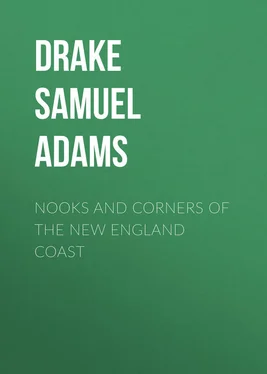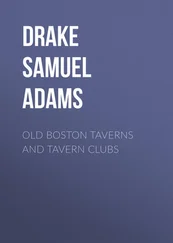Samuel Drake - Nooks and Corners of the New England Coast
Здесь есть возможность читать онлайн «Samuel Drake - Nooks and Corners of the New England Coast» — ознакомительный отрывок электронной книги совершенно бесплатно, а после прочтения отрывка купить полную версию. В некоторых случаях можно слушать аудио, скачать через торрент в формате fb2 и присутствует краткое содержание. Жанр: foreign_antique, foreign_prose, на английском языке. Описание произведения, (предисловие) а так же отзывы посетителей доступны на портале библиотеки ЛибКат.
- Название:Nooks and Corners of the New England Coast
- Автор:
- Жанр:
- Год:неизвестен
- ISBN:нет данных
- Рейтинг книги:3 / 5. Голосов: 1
-
Избранное:Добавить в избранное
- Отзывы:
-
Ваша оценка:
- 60
- 1
- 2
- 3
- 4
- 5
Nooks and Corners of the New England Coast: краткое содержание, описание и аннотация
Предлагаем к чтению аннотацию, описание, краткое содержание или предисловие (зависит от того, что написал сам автор книги «Nooks and Corners of the New England Coast»). Если вы не нашли необходимую информацию о книге — напишите в комментариях, мы постараемся отыскать её.
Nooks and Corners of the New England Coast — читать онлайн ознакомительный отрывок
Ниже представлен текст книги, разбитый по страницам. Система сохранения места последней прочитанной страницы, позволяет с удобством читать онлайн бесплатно книгу «Nooks and Corners of the New England Coast», без необходимости каждый раз заново искать на чём Вы остановились. Поставьте закладку, и сможете в любой момент перейти на страницу, на которой закончили чтение.
Интервал:
Закладка:
It was, indeed, as I have heard, a dreadful night, and many a vigil was kept by wife, mother, and sweetheart. At day-break the snow lay heaped in drifts in the village streets and garden areas. It was not long before a messenger came riding in at full speed with the news that the shores of Ogunquit were fringed with the wreck of a large vessel, and that not one of her crew was left to tell the tale. The word passed from house to house. Silence and gloom reigned within the snow-beleaguered village.
It was supposed the ship struck about midnight, as the Ogunquit fishermen heard in their cabins cries and groans at this hour above the noise of the tempest. They were powerless to aid; no boat could have been launched in that sea. If any lights were shown on board the ship, they were not seen; neither were any guns heard. The ropes, stiffened with ice, would not run through the sheaves, which rendered the working of the ship difficult, if not impossible. No doubt the doomed vessel drove helplessly to her destruction, the frozen sails hanging idly to the yards, while her exhausted crew miserably perished with the lights of their homes before their eyes.
All the morning after the wreck the people along shore were searching amidst the tangled masses of drift and sea-wrack the storm had cast up for the remains of the crew. They were too much mangled for recognition, except in a single instance. Captain G – , a passenger, had by accident put on his red-flannel drawers the wrong side out the morning the Isidore sailed, observing to his wife that, as it was good luck, he would not change them. One leg was found encased in the drawers. The mutilated fragments were brought to the village, and buried in a common grave.
Some of the old people at the Port declare to this day that on the night of the wreck they heard shrieks as plainly as ever issued from human throats; and you could not argue it out of them, though the spot where the Isidore's anchors were found is ten miles away. As for Joe B – , the runaway, he can not refrain from shedding tears when the Isidore is mentioned.
"But, Ben, do you believe in dreams?" I asked, with my hand on the latch.
"B'leeve in dreams!" he repeated; "why, Joe's a living man; but where's his mates?"
Perhaps they
"Died as men should die, clinging round their lonely wreck,
Their winding-sheet the sky, and their sepulchre the deck;
And the steersman held the helm till his breath
Grew faint and fainter still;
There was one short fatal thrill,
Then he sank into the chill
Arms of Death."
I turned away from the spot with the old sailor's words in mind: "A wicked place where she struck; and the sea drove right on. A ragged place, sir – ragged."
Leaving the cliff, I struck across the pastures to the road, making no farther halt except to gather a few huckleberries that grew on high bushes by the roadside. The fruit is large, either black or blue, with an agreeable though different flavor from any of the low-bushed varieties. The local name for the shrub is "bilberry." It frequently grows higher than a man's head, and a single one will often yield nearly a quart.
It was a year of plenty, and I had seen the pickers busy in the berry pastures as I passed by. The fruit, being for the time a sort of currency – not quite so hard, by-the-bye, as the musket-bullets of the colonists – is received in barter at the stores. Whole families engage in the harvest, making fair wages, the annual yield exceeding in value that of the corn crop of the State. Maine grows her corn on the Western prairies, and pays for it with canned fish and berries.
At the village store I saw a woman drive up with a bushel of huckleberries, with which she bought enough calico for a gown, half a pound of tobacco, and some knickknacks for the children at home. Affixed in a conspicuous place to the wall was the motto, "Quick sales and small profits." Half an hour was spent in beating the shop-keeper down a cent in the yard, and another quarter of an hour to induce him to "heave in," as she said, a spool of cotton. The man, after stoutly contesting the claim, finally yielded both points. "The woman," thought I, "evidently only half believes in your seductive motto."
All along the road I had met women and children, going or returning, with pails or baskets. One man, evidently a fast picker, had filled the sleeves of his jacket with berries, after having first tied them at the wrists. Another, who vaulted over the stone wall at my side, when asked if he was going to try the huckleberries, replied,
"Wa'al, yes; think I'll try and accumulate a few."
Descending the last hill before reaching Cape Neddock Harbor, I had a good view of the Nubble, which several writers have believed was the Savage Rock of Gosnold, and the first land in New England to receive an English name. The reliable accounts of the early voyagers to our coasts are much too vague to enable later historians to fix the points where they made the land with the confidence with which many undertake to fix them. A careful examination of these accounts justifies the opinion that Gosnold made his landfall off Agamenticus, and first dropped anchor, since leaving Falmouth, at Cape Ann. The latitude, if accurately taken, would of itself put the question beyond controversy; but as the methods of observing the exact position of a ship were greatly inferior to what they became later in the seventeenth century, I at first doubted, and was then constrained to admit, that the reckoning of Gosnold, Pring, and Champlain ought to be accepted as trustworthy. Gabriel Archer, who was with Gosnold, says, "They held themselves by computation well neere the latitude of 43 degrees," or a little northward of the Isles of Shoals. John Brereton, also of Gosnold's company, says they fell in with the coast in thick weather, and first made land with the lead. By all accounts the Concord , Gosnold's ship, was to the northward of Cape Ann. Land was sighted at six in the morning of the 14th of May, 1602, and Gosnold stood "fair along by the shore" until noon, which would have carried him across Ipswich Bay, even if the Concord were a dull sailer. In 1603 Martin Pring sailed over nearly the same track as Gosnold. It is by comparing these two voyages that Savage Rock appears to be located at Cape Ann.
Pring, says Gorges, observing his instructions (to keep to the northward as high as Cape Breton), arrived safely out and back, bringing with him "the most exact discovery of that coast that ever came to my hands since; and indeed he was the best able to perform it of any I met withal to this present." Pring's relation wrought such an impression on Sir F. Gorges and Lord Chief-justice Popham that, notwithstanding their first disasters, they resolved on another effort. He had no doubt seen and talked with Gosnold after his return; perhaps had obtained from him his courses after he fell in with the coast.
The Speedwell , Pring's vessel, also made land in forty-three degrees. It proved to be a multitude of small islands. Pring, after anchoring under the lee of the largest, coasted the main-land with his boats. The narrative continues to relate that they "came to the mayne in 43½, and ranged to south-west, in which course we found several inlets, the more easterly of which was barred at the mouth. Having passed over the bar, we ran up into it five miles. Coming out and sailing south-west, we lighted upon two other inlets; the fourth and most westerly was best, which we rowed up ten or twelve miles." Between forty-three and forty-three and a half degrees are the Saco, then barred at the mouth, 67 67 An old sea-chart says, "Saco River bear place at low water."
the Mousam, York, and the Piscataqua, the "most westerly and best."
"We (meeting with no sassafras)" – to follow the narrative – "left these places and shaped our course for Savage's Rocks , discovered the year before by Captain Gosnold." Savage Rock, then, was by both these accounts (Archer and Pring) to the southward of forty-three degrees, while the Nubble, or rather Agamenticus, is in forty-three degrees sixteen minutes.
Читать дальшеИнтервал:
Закладка:
Похожие книги на «Nooks and Corners of the New England Coast»
Представляем Вашему вниманию похожие книги на «Nooks and Corners of the New England Coast» списком для выбора. Мы отобрали схожую по названию и смыслу литературу в надежде предоставить читателям больше вариантов отыскать новые, интересные, ещё непрочитанные произведения.
Обсуждение, отзывы о книге «Nooks and Corners of the New England Coast» и просто собственные мнения читателей. Оставьте ваши комментарии, напишите, что Вы думаете о произведении, его смысле или главных героях. Укажите что конкретно понравилось, а что нет, и почему Вы так считаете.












